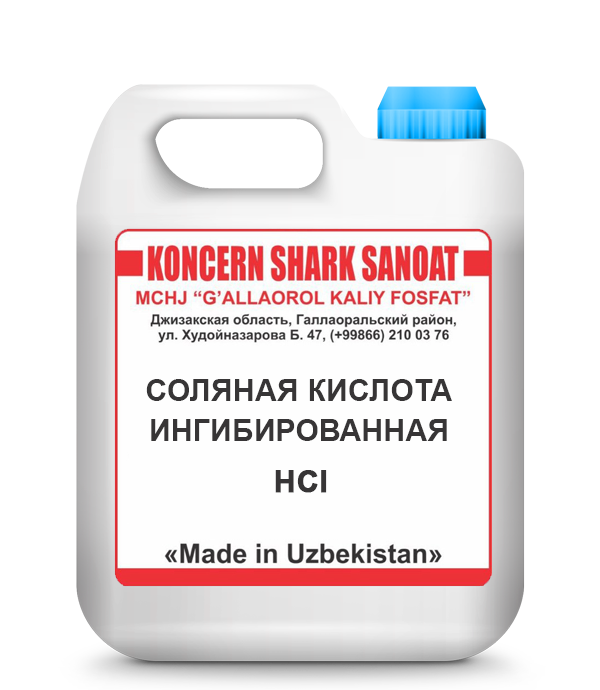
Inhibited hydrochloric acid HCl in terms of composition is a mixture of hydrochloric acid with a mass fraction of hydrogen chloride of 20-24% (synthetic, technical or being an intermediate product of chemical industries). Designed for acid treatment and suppression of sulfate-reducing bacteria in the bottomhole zone of oil wells, for pickling ferrous metals and products from them, as well as for chemical cleaning of boilers and apparatuses.
Price: 1 250 000 UZS/tonne
Inhibited hydrochloric acid is a corrosive, non-flammable liquid that dissolves most metals and oxides. However, porcelain, ceramics, glass, granite are resistant to it. The acid mixes well with water, ether and benzene.
Inhibited hydrochloric acid is capable of decomposing any deposits, in particular carbonate ones, while not exerting significant negative effects on the metal. This property is possible due to the inhibitor dissolved in acid.
The ability of inhibited hydrochloric acid to dissolve carbonate deposits has found wide application in the oil industry. It is widely used to stimulate reservoirs in oil development. This acid is intended for acidizing wells, and is also used to suppress sulfate-reducing bacteria.
Since oil-rich formations are often far from the ideal state for the start of oil production, one of the most important stages of oil development is preparatory. The quality of oil and oil products, as well as their price, depends on how well it will be completed. Too dirty oil, in which there are many impurities, requires high-quality purification, expensive reagents. Therefore, when producing, it is important to take into account all possible investments associated with improving the quality of oil reservoirs. One of the common problems is corrosion of various types, which affects both oilfield equipment and the product itself. To improve the condition of rocks composed of limestone, dolomite rocks, and also contaminated with carbonate deposits, inhibited hydrochloric acid is used. It improves the connectivity of wells with the formation,
Acid treatment of wells is an effective method of cleaning a productive formation from pollution products that have entered or formed in the bottomhole zone during the opening process by drilling, cementing the casing or during the operation of the well.
Well flow rate largely depends on the permeability of the productive formation (mainly its bottomhole zone – BHZ), which always changes during the completion and operation of the well. Reservoir properties inevitably deteriorate due to swelling of clays, precipitation of salts from formation waters, formation of stable emulsions, deposition of resins, paraffins and corrosion products in the filter section of the wellbore, hydration of rocks, and proliferation of sulfate-reducing bacteria.
In addition to being used in the oil industry, inhibited hydrochloric acid is used for etching and cleaning oxidized layers of ferrous and non-ferrous metals, as well as for chemical cleaning from inorganic deposits, scale boilers or apparatus.
The advantage of inhibited hydrochloric acid is that it retains anti-corrosion stability during the entire storage period. At the same time, it does not negatively affect the coating of tanks, and also does not affect the quality of oil and the process of oil refining.
G’allaorol Kaliy Fosfat LLC offers inhibited hydrochloric acid for acidizing and suppressing sulfate-reducing bacteria in the bottomhole zone of oil wells, in order to improve the connectivity of reservoirs and wells with each other, as well as to clean and expand pores and cracks … Also, inhibited hydrochloric acid is used in order to remove the filtration resistance of reservoirs that are composed of carbonate rocks (dolomite and limestone) or contaminated with carbonate deposits.

